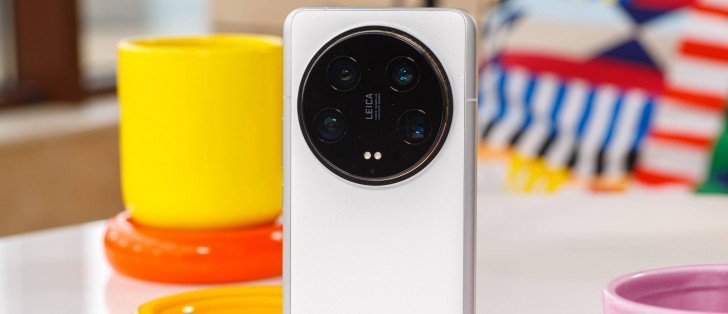Introduction
A few small but meaningful upgrades to the camera system, tweaks to the build and display, and the mandatory chipset refresh – we can’t be mad at the Xiaomi 14 Ultra for its short list of changes, when last year’s model was already one of the best cameraphones in existence.

Indeed, the 14 Ultra doesn’t stray too far from its predecessor. The main camera had a 1-inch sensor and dual-aperture lens on the 2023 model, the 2024 one uses a newer 1-inch sensor and makes that a truly variable aperture (with intermediate steps). The zoom cameras (two of them, as seemingly required to be called an Ultra), meanwhile, bring close focusing to the table and the longer of them also gets a slightly brighter lens.
On the outside, Xiaomi has replaced the Corning-branded glass of the old model with an in-house concoction that should be more durable (asterisks, of course), and the non-leather leather has also been improved. There’s a new aluminum alloy used for the frame in the International version, while China also gets a titanium option on top of that. Sounds like a win.

Improvements in the display section are hard to spot, but there’s a promise for slightly more brightness (hardly a gamechanger), while the new Snapdragon is the new Snapdragon – better than the old one, more or less the same across all 2024 models.
Xiaomi has chosen not to mess around with battery capacity or charging speed on the global variant (Chinese version does get an extra 300mAh), and we think we could have used a bump in longevity – maybe we’ll get that from elsewhere.
Xiaomi 14 Ultra specs at a glance:
- Body: 161.4×75.3×9.2mm, 220g; Glass front (Xiaomi Shield Glass), glass or eco leather back, titanium (grade 5) or aluminum alloy frame; IP68 dust/water resistant (up to 1.5m for 30 min).
- Display: 6.73″ LTPO AMOLED, 68B colors, 120Hz, Dolby Vision, HDR10+, 1000 nits (typ), 3000 nits (peak), 1440x3200px resolution, 20:9 aspect ratio, 522ppi.
- Chipset: Qualcomm SM8650-AB Snapdragon 8 Gen 3 (4 nm): Octa-core (1×3.3 GHz Cortex-X4 & 3×3.2 GHz Cortex-A720 & 2×3.0 GHz Cortex-A720 & 2×2.3 GHz Cortex-A520); Adreno 750.
- Memory: 256GB 12GB RAM, 512GB 16GB RAM, 1TB 16GB RAM; UFS 4.0.
- OS/Software: Android 14, HyperOS.
- Rear camera: Wide (main): 50 MP, f/1.6-f/4.0 variable aperture, 23mm, 1.0″, 1.6µm, multi-directional PDAF, Laser AF, OIS; Telephoto: 50 MP, f/1.8, 75mm, 1/2.51″, 0.7µm, dual pixel PDAF (10cm – ∞), OIS, 3.2x optical zoom; Telephoto: 50 MP, f/2.5, 120mm, 1/2.51″, 0.7µm, dual pixel PDAF (30cm – ∞), OIS, 5x optical zoom; Ultra wide angle: 50 MP, f/1.8, 12mm, 122˚, 1/2.51″, 0.7µm, dual pixel PDAF; Depth: TOF 3D.
- Front camera: 32 MP, f/2.0, 22mm (wide), 1/3.14″, 0.7µm.
- Video capture: Rear camera: 8K@24/30fps, 4K@24/30/60/120fps, 1080p@30/60/120/240/480/960/1920fps, gyro-EIS, Dolby Vision HDR 10-bit rec. (4K@60fps, 1080p); Front camera: 4K@30/60fps, 1080p@30/60fps, gyro-EIS.
- Battery: 5000mAh; 90W wired, PD3.0, QC4, 80W wireless, 10W reverse wireless.
- Connectivity: 5G; Dual SIM; Wi-Fi 7; BT 5.4, aptX HD, aptX Adaptive, LHDC; NFC; Infrared port.
- Misc: Fingerprint reader (under display, optical); stereo speakers.
Xiaomi 14 Ultra unboxing
Little has changed in the presentation and the 14 Ultra comes in the usual black thick cardboard box with simple Xiaomi lettering and a red Leica badge to add a splash of color. The internal packaging is all made of paper, so that’s a win.

The contents include a 90W charger (same as last year’s) and a proprietary USB-A-to-C cable to go with it. Xiaomi has also bundled a translucent plastic snap-on back cover to protect the Ultra out of the box. It’s on the cheap side, but something is better than nothing, plus the phone itself is supposedly more durable than the previous iteration. Let’s see what that’s about.

